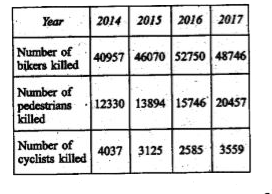As per ancient Indian philosophy, the Purusharthas or the four aims of life does NOT include:
Kama
Moksha
artha
yasha
The correct Answer is:D
The purusharthas refers to four proper goals or aims of a human life.
(i) Artha (Economic value)
(ii) Kama(pleasure)
(iii)Dharma (moral values)
(iv) Moksha (spiritual values)
Topper's Solved these Questions
- HISTORYBOOK - PINNACLECHAPTER - HISTORYEXERCISE - MEDIEVAL HISTORY ( FOREIGN INVASIONS)
12 Videos
- HISTORYBOOK - PINNACLECHAPTER - HISTORYEXERCISE - DELHI SULTANATE
12 Videos
- HISTORYBOOK - PINNACLECHAPTER - HISTORYEXERCISE - VARDHANA DYNASTY
8 Videos
- GEOGRAPHYBOOK - PINNACLECHAPTER - GEOGRAPHYEXERCISE - WORLD GEOGRAPHY AND MAP
3 Videos
- PHYSICS BOOK - PINNACLECHAPTER - PHYSICS EXERCISE - UNITS AND MEASCUREMENT
57 Videos
Similar Questions
Read the following information and answer the four items that follow :
The data shows that Indian roads are turning deadlier over the years.

What was the average number of pedestrians killed per day in the year 2017?
View SolutionIn this question below is given a statement followed by three assumption numbered I II and III. you have to considered the statement and the following assumptions decide which of the assumptions is implicit in the statement and choose your answer accordingly.
Statement: Quality of life of a person is not dependent only on his wealth.
Assumption I. The aim of most people is just to acquire more wealth
II. There are some factors other than wealth which contribute to the quality of life.
III. Wealth does not contribute to the quality of life at all.
(a) Only I is implicit.
(b) Only I and II are implicit.
[c] Only II is implicit.
(d) Only II and III are implicit.
(e) Only I and III are implicit.
View Solution
Knowledge Check
According to ancient Indian cosmogonic ideas, the sequential order of the cycle of four epochs (yagas ) is -
ADvapara, Krita, Treta and KaliBKrita, Dvapara, Treta and KaliCKrita, Treta, Dvapara and KaliDTreta, Dvapara, Kali and KritaSentences are given with blanks to be filled in with an appropriate and suitable word. Four alternatives are suggested for each question. Choose the correct alternative out of the four. When Indians from the South move North, they find certain aspects of life quite ……… from their own.
AstrangeBseparateCdifferentDdivergentThere are four passages in this Section. Each passage is followed by five questions. Read each passage carefully and answer the questions that follow. For each question, four probable answers as (A), (B), (C) and (D) are given. Only one out of these is correct. Choose the correct answer.
Travelling is both recreational and educative. It has always been regarded as an important part of education. In Europe, a young man is considered fully educated only when he has travelled through many countries of Europe. In ancient India also, our sages understood the great value of travelling. They made it a pious duty of all to visit various pilgrim centres situated in different parts of India. This encouraged the feeling of oneness among Indians.
Visiting the ........... centres was considered holy in ancient India.AtrainingBpilgrimCcityDbusiness
In the context of ancient Indian society which one of the following terms does not belong to the category of the other three?
View SolutionLung diseases are about four times more probable in urban areas as compared to rural areas . This is due to the presence of which of the following in atmosphere ?
View SolutionThe Swarnjayanti Shahari Rojgar Yojana which came into operation from 1.12.1997 aims to provide gainful employment poor but urban unemployment or under - employed poor but does NOT include :
View SolutionThe HDI is a composite statistic of life expectancy, education, and per capita income indicators, used to rank countries into four tiers of human development. What does "H" mean in HDI ?
View SolutionAncient Indian educational system focused on building a disciplined and values-based culture. Human values such as trust, respect, honesty, dignity, and courtesy are the building blocks of any free, advanced society. The convocation addresses from ancient time throws significant light on the qualities required to be developed in the students which are not very different from the qualities that modern educational systems are trying to impart. Discipline like character is an essential quality for personal as well as social life. It consists in obedience to laws, rules and decisions. In this regard we must admit that ancient Indian system of education played a major role in making students realize their duties and responsibilities and emphasized on the necessity of discipline for an orderly social life. Character and discipline cannot be imparted to an individual by preaching or through speeches. While students can be imparted with the knowledge of what is moral and what is immoral, what is discipline and what is indiscipline, what is character and what is characterless, they can be made to act in conformity with the required standard of behaviour, only through personal example. These qualities are acquired by emulation in addition to education.The modern school education system in India comprising primary, middle and secondary levels vary considerably across the states since education is primarily the responsibility of the state governments. Most states follow five years of primary, three years of middle and two years each of secondary and higher secondary levels shown in appendix Q. In the public schools, the lessons are taught mostly in regional languages and English is learned as second language while private schools use English to teach most of the subjects. The system of higher education is however more or less uniform across the country and taught mostly in English. The first level degrees in non-technical subjects usually require about three years while the technical degree courses span over four years.
What was the aim of ancient educational system
View Solution
